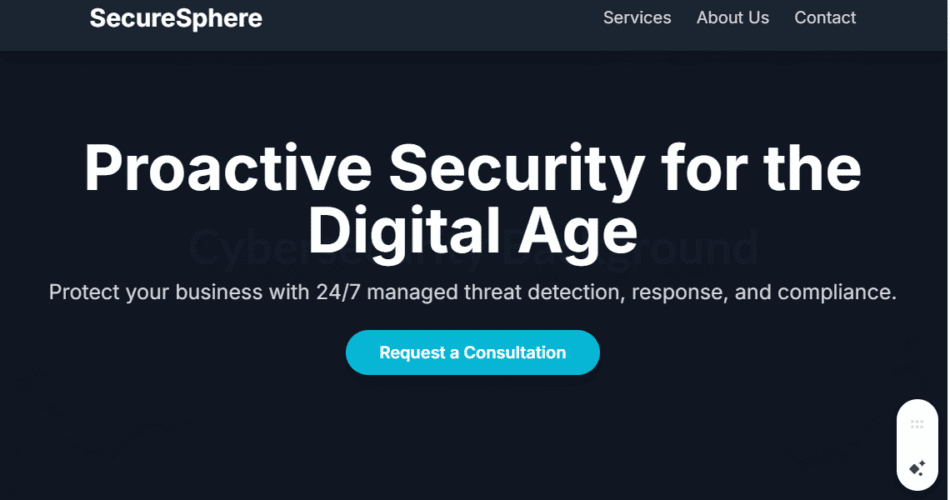Managed Security Services Kenya
- Delivery Time2 Weeks
- English levelProfessional
- LocationUSA, United Kingdom, United Arab Emirates, New York, Kilimani, Kenya, Dubai, CBD Nairobi, Canada, Australia
Service Description
The cost of Managed Security Services in Kenya is 150000KES per month.Get the Managed Security Services in kenya at a price of 100000KES Per month at Black Shepherd Technologies.
Managed Security Services (MSS): Proactive 24/7 threat monitoring, detection, and response. Outsource your cybersecurity to expert analysts and advanced technology to protect your business from evolving cyber threats. We offer SIEM, EDR, and incident response to secure your digital assets, ensure compliance, and minimize risk without the high cost of an in-house team.
Managed Security Services (MSS) represent a comprehensive, outsourced approach to cybersecurity, where a third-party provider takes on the responsibility of protecting an organization’s digital assets. In an era of escalating and sophisticated cyber threats, MSS has become an essential strategy for businesses of all sizes, allowing them to leverage specialized expertise and technology without the significant capital investment and operational overhead of building an in-house security team. The core value proposition of MSS is to provide proactive, 24/7 monitoring, threat detection, and incident response, thereby significantly reducing the attack surface and minimizing the potential impact of a breach.
At its heart, MSS is built upon a foundation of people, processes, and technology. The “people” component consists of a team of highly skilled and certified cybersecurity professionals—analysts, threat hunters, incident responders, and compliance experts. These individuals possess a deep understanding of the ever-evolving threat landscape, from malware and ransomware to phishing and zero-day exploits. They are adept at using advanced security tools to identify and analyze suspicious activity, and they possess the critical thinking skills required to differentiate between a false positive and a genuine threat. Their expertise allows organizations to access a level of talent that would be prohibitively expensive to hire and retain on their own.
The “processes” are the structured methodologies and protocols that govern how security is managed. This includes a robust framework for incident response, which outlines the steps to be taken when a breach is detected, from containment and eradication to recovery and post-mortem analysis. These processes also encompass threat intelligence gathering, where the MSS provider continuously monitors global threat actors and vulnerabilities to anticipate and mitigate future attacks. Regular security assessments, vulnerability scanning, and penetration testing are also key processes that help identify weaknesses before they can be exploited. Furthermore, MSS providers often assist with compliance and regulatory adherence, helping businesses navigate complex standards like GDPR, HIPAA, and PCI DSS.
The “technology” stack is the engine that powers MSS. It is a sophisticated suite of tools that includes, but is not limited to:
Security Information and Event Management (SIEM): A SIEM system aggregates and analyzes log data from various sources—servers, firewalls, applications, etc.—to provide a centralized view of security events. The MSS provider’s analysts use the SIEM to correlate events and identify patterns that may indicate a compromise.
Endpoint Detection and Response (EDR): EDR solutions go beyond traditional antivirus by providing continuous monitoring and data collection from endpoints (laptops, desktops, servers). This allows analysts to hunt for threats and respond to incidents directly on the affected devices.
Intrusion Detection/Prevention Systems (IDS/IPS): These systems monitor network traffic for malicious activity or policy violations. An IDS alerts on suspicious activity, while an IPS can actively block it.
Threat Intelligence Platforms (TIPs): TIPs collect and disseminate information about known threats, vulnerabilities, and threat actors, enabling the MSS provider to proactively protect their clients.
Cloud Access Security Brokers (CASBs): With the proliferation of cloud services, CASBs are essential for enforcing security policies, managing access, and monitoring activity within cloud environments.
Vulnerability Management Platforms: These tools automatically scan for and prioritize software vulnerabilities, helping organizations patch and remediate weaknesses in a timely manner.
The services offered under the MSS umbrella are highly customizable, ranging from basic monitoring to a fully outsourced security operations center (SOC). A typical engagement might begin with a comprehensive assessment of the client’s current security posture, followed by the deployment of the necessary technology and the establishment of a baseline for normal network activity. From there, the MSS provider’s team takes over the day-to-day security operations, which can include:
24/7/365 Monitoring and Alerting: Continuous vigilance is crucial. The MSS provider’s SOC operates around the clock, ensuring that any potential threat is identified and acted upon immediately, regardless of when it occurs.
Threat Hunting: This is a proactive, investigative approach where analysts actively search for threats that have evaded automated security tools. Threat hunting is a critical service for detecting advanced persistent threats (APTs).
Incident Response: When an incident is confirmed, the MSS provider’s team springs into action, executing a predefined response plan to contain the breach, eradicate the threat, and restore normal operations. This service can be invaluable in minimizing downtime and financial loss.
Vulnerability Management: The provider manages the process of identifying, prioritizing, and assisting in the remediation of vulnerabilities in the client’s IT infrastructure.
Security Device Management: This includes the configuration, maintenance, and tuning of security technologies like firewalls, IDS/IPS, and web application firewalls (WAFs) to ensure they are operating optimally.
Reporting and Compliance: Regular reporting provides clients with visibility into their security posture, threat trends, and incident summaries. MSS providers also generate reports that help organizations demonstrate compliance to auditors and regulatory bodies.
The benefits of adopting MSS are substantial. Economically, it provides a predictable operational expense (OPEX) model, avoiding the significant capital expenditures (CAPEX) associated with building and maintaining a full-fledged SOC. It also addresses the critical cybersecurity talent shortage by giving businesses access to a pool of expert professionals. From a strategic perspective, MSS allows organizations to focus on their core business functions, confident that their cybersecurity is in the hands of specialists. The proactive nature of MSS, combined with the rapid response capabilities, significantly reduces the likelihood and impact of a cyberattack, thereby protecting brand reputation, customer trust, and financial stability. In essence, Managed Security Services are no longer a luxury but a strategic necessity for any organization looking to thrive in the modern digital landscape.








